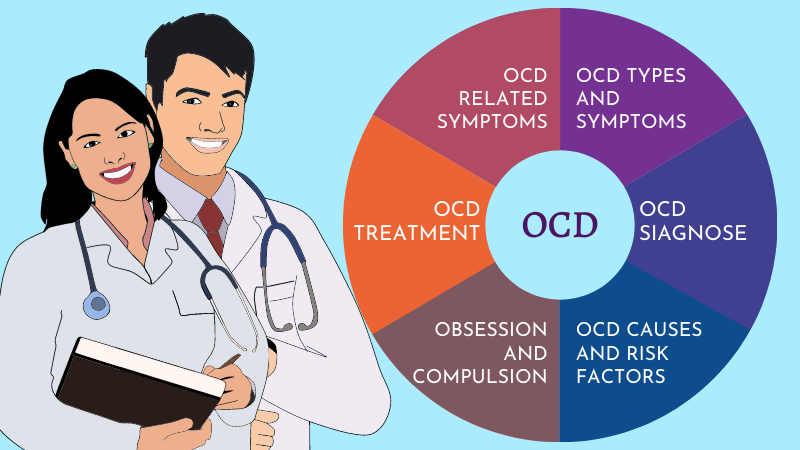
OCD is a mental illness in which people get recurring unwanted thoughts and sensations (obsession), or the urge to do something over and over again (compulsion). This is the common sign of OCD, but some people can have both obsession and compulsion.
OCD is not about having the habits of biting your nails all the time or negative thoughts, but an obsessive thought might be that certain numbers are good or bad. The compulsive disorder might be to wash your hand several times a day. You have no control over what you are doing, not even you are liking it, but you are simply doing it.
The repetitive behavior of hand washing, cleaning things, or checking on things can significantly affect an individual’s daily activities and social interactions.
It is common for OCD people to have disturbing thoughts and repetitive behaviors. However, these thoughts or behavior do not interrupt their daily activities. For them thought are persistent and behaviors are rigid. While some people with OCD know or suspect their thoughts are not realistic, others may consider them to be true. Even those who know their thoughts are not realistic but they have no control over it. They have difficulties in disengaging from the obsessive thoughts and stopping compulsive thoughts.
Everyone has the thoughts that are repetitive sometimes, but with people with OCD have the common actions or thoughts that: –
- Take up for at least an hour a day
- You have no control over it
- Are not enjoyable
- Affect or interrupt your social life, personal life, and professional life
OCD Types and Symptoms
OCD comes in various forms, but the most common types fall under the four general categories that are mentioned below: –
Checking
You always keep checking on things like locks, alarm systems, ovens, lights switch, or thinking you have medical conditions like pregnancy or schizophrenia.
Contamination
A fear of things that might be dirty and keep cleaning everything. Persistent worry about the pests and sickness, feeling dirty or unclean, compulsion to get rid of the things that you find or think are dirty.
Symmetry and ordering
Extreme need for items and belongings to be aligned in a certain way.
Forbidden thoughts
An obsession with line of thoughts. Some of these thoughts might be disturbing and violent as well.
Obsession and Compulsion
Many people with OCD know that their thought and behaviour are not realistic and doesn’t make any sense, yet they can’t stop themselves from doing it. They have no control over it. And if somehow they stop, they feel so bad that they start doing it again.
Types of obsessions
- Feeling of getting hurt
- Feeling of getting contaminated due to harmful environment
- Disturbing sexual thoughts
- Constant awareness of blinking, breathing, and other body sensations
- Fear of losing something important
Types of compulsions
- Repeated cleaning of household and other objects
- Ordering or arranging items in a certain way
- Doing a particular thing every time or a good numbers of time
- Fear of doing some particular things like using public toilets, touching door knobs, etc.
- Repeatedly checking locks, appliances, etc.
OCD causes and risk factors
Don’t are not sure why people have OCD. But, stress can make the symptoms worse. OCD are most common in women than men. And teens and young adults are more affective with OCD.
OCD risk factors may include the following: –
- Depression, anxiety, tics
- Trauma
- History of physical and sexual abuse
- Physical differences in certain parts of your brain
How is OCD Diagnosed?
If you or any of your loved ones have OCD symptom then you must see to a mental healthcare provider. They can diagnose OCD and work to find the most effective treatment.
A mental healthcare provider will ask you some questions to know more about the symptoms you are experiencing. Also, he would know whether it is causing distress, and how much time they take up each day.
Apart from this, he will do a physical test by taking blood test to know if something else is causing the symptoms. He will know about your feelings, thoughts, and habits. To diagnose OCD, the symptoms should affect your daily activities at least an hour of your day. Your medical health advisor then note the group of symptoms you experience as not all the OCD treatments have the same benefits of all types of symptoms.
After this the doctor can plan or find the right treatment for you.
OCD Treatment
There’s no cure for OCD. So, the medical experts use therapy, medication, or the combination of two to help you manage the symptoms of OCD that affects your life. OCD treatments may include: –
- Psychotherapy
- Relaxation
- Neuromodulation
- Medication
- Transcranial magnetic stimulation
OCD related symptoms
Some other conditions are similar to OCD and such things involve the obsessions like: –
- Your looks
- Physical illness
- Excoriation (picking at your skin)
- Collecting, arranging, or ordering things
- How you smell
The bottom line
There’s no particular symptoms of OCD, but this can be present in many different ways. Also, it is possible to have OCD combined with other mental conditions like schizophrenia, anxiety, a tic disorder, etc.
No matter what symptoms you have, treatments can help you.
With the right treatment your OCD symptoms can improve. Getting right treatment from best the psychiatrist near you can help you improve your condition, day-to-day activities of life, and quality of life.